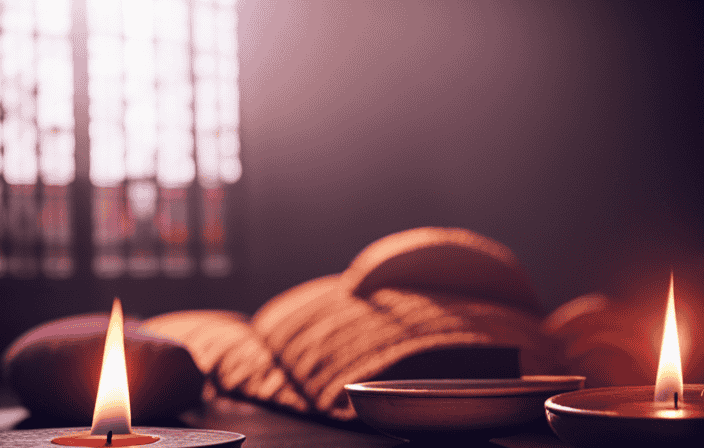They say the darkest hour is right before the dawn.
In our quest for inner peace, we often find ourselves grappling with spiritual malady – a disconnection from our higher power, ourselves, and those around us. It’s a journey that requires courage, vulnerability, and a willingness to confront our deepest fears.
But fear not, for there is hope. Through prayer, meditation, and the support of others, we can overcome this malady and find the serenity we seek.
Join me as we explore the path to finding inner peace and overcoming spiritual malady.
Key Takeaways
- Spiritual malady is a sense of disconnection from higher power, self, and others, leading to symptoms such as lack of purpose, hopelessness, addiction, and destructive behaviors.
- Causes of spiritual malady can include trauma, stress, loss, and a disconnection from spirituality, while emotional and psychological factors trigger disconnection, loneliness, and lack of purpose.
- Ways to overcome spiritual malady include prayer and meditation, connecting with nature, being thankful, aiding others, and seeking professional assistance.
- Overcoming spiritual malady leads to inner peace, a more fulfilling life, improved relationships, and a greater sense of connection, and it requires self-reflection, daily habits, seeking support, and continued growth and learning.
What is Spiritual Malady?
I understand that spiritual malady is a sense of disconnection from higher power, self, and others. It manifests as a lack of purpose, hopelessness, addiction, and destructive behaviors. It can feel like being lost in a sea of darkness, unable to find our way back to the light.
In those moments, we may question our worth and wonder if we will ever find inner peace. But I want you to know that you are not alone in this struggle. There is hope and there is a path towards healing.
By acknowledging our disconnection and seeking support, we can begin to mend our spirits. It takes courage and vulnerability, but through prayer, meditation, and connecting with nature, we can start to rediscover our purpose and find inner peace once again.
Causes and Triggers
Causes and triggers of spiritual malady can stem from various sources such as trauma, stress, and a disconnection from spirituality. These factors can lead to a sense of disconnection from higher power, self, and others. It is important to recognize that spiritual malady is not a personal failing, but rather a response to life’s challenges. To better understand the causes and triggers, let’s take a look at the following table:
| Causes | Emotional and Psychological Triggers |
|---|---|
| Trauma | Disconnection and loneliness |
| Stress | Lack of purpose and hopelessness |
| Loss | Anxiety and depression |
| Disconnection from spirituality | Addiction and negative self-talk |
By acknowledging these causes and triggers, we can begin to address them with compassion and empathy. It is crucial to seek support and guidance from professionals, and to engage in practices such as prayer, meditation, and connecting with nature to overcome spiritual malady. Remember, everyone’s journey towards inner peace is unique, and setbacks may occur along the way. Keep persevering, and know that help is available.
Symptoms of Disconnection
Indifference towards spirituality, isolation, and detachment from self and others are some of the symptoms of disconnection. When we feel disconnected, it can be overwhelming and difficult to navigate through life. But remember, you’re not alone in this journey.
Take a moment to reflect on these four important points:
-
Feeling lost and purposeless is a common symptom of spiritual malady. It’s okay to not have all the answers right now, but know that there is hope for finding your path.
-
Isolation can make us feel like we’re the only ones going through this struggle. Reach out to others who may be experiencing similar feelings and build a supportive community.
-
Detachment from ourselves and others can lead to a sense of emptiness. By practicing self-care and fostering meaningful connections, we can start to rebuild those bonds.
-
Remember, healing takes time and effort. Be patient with yourself as you work towards finding inner peace and overcoming spiritual malady.
You deserve a life filled with connection and fulfillment. Keep moving forward, and know that there is light at the end of the tunnel.
Ways to Overcome
Engaging in self-reflection and seeking support from others are essential steps in overcoming spiritual disconnection. It is important to take the time to look within ourselves and examine our thoughts, emotions, and beliefs. This self-reflection allows us to gain a deeper understanding of our spiritual needs and desires. It is through this process that we can uncover the root causes of our disconnection and begin to heal. Seeking support from others who have experienced similar struggles can provide us with guidance, encouragement, and a sense of belonging. Together, we can create a safe and supportive community where we can share our experiences, learn from one another, and grow spiritually.
To evoke an emotional response in the audience, let’s consider the following table:
| Struggles | Solutions | Benefits |
|---|---|---|
| Loneliness | Joining a spiritual community | Feeling supported and connected |
| Lack of purpose | Setting meaningful goals | Finding fulfillment and direction |
| Negative self-talk | Practicing self-compassion | Cultivating self-love and acceptance |
Remember, overcoming spiritual disconnection is a journey that takes time and effort. Be patient with yourself and trust that with self-reflection and support, you can find inner peace and reconnect with your spiritual self.
Developing a Connection
I’m actively working on developing a deeper connection with my spirituality. It’s a journey of self-discovery and growth. I strive to build trust and vulnerability with others.
Through conversations with like-minded individuals, I find emotional and mental support. This helps me navigate the challenges of life. Developing a spiritual connection provides solace in times of crisis and promotes personal and communal growth.
I understand that continued growth and learning are necessary to overcome spiritual malady. Engaging with others and seeking personal development opportunities are important aspects of this process.
It’s through these connections that I find peace, purpose, and a sense of belonging. By nurturing my spiritual connection, I’m able to cultivate inner peace and live a more fulfilling life.
Benefits of Overcoming
As I reflect on the journey of overcoming spiritual malady, I can’t help but acknowledge the profound benefits that await those who persevere.
It is a path that leads not only to inner peace but also to a life that is more fulfilling and connected.
When we conquer the sense of disconnection and find our spiritual grounding, our relationships blossom and thrive. It is as if a veil is lifted, allowing us to embrace vulnerability, trust, and authenticity with others.
This newfound connection becomes a source of strength and support, especially during times of crisis.
But the benefits don’t end there. We continue to grow and learn, seeking personal development opportunities that nourish our souls.
And through it all, we discover that setbacks are merely stepping stones on this unique and transformative journey.
Importance of Spiritual Wellness
Nurturing a strong connection with our spirituality is crucial for maintaining overall well-being and a sense of fulfillment. Spiritual wellness goes beyond just finding inner peace; it encompasses a deep understanding of ourselves and our place in the world.
When we prioritize our spiritual well-being, we become more self-aware and attuned to our emotions, thoughts, and actions. This self-reflection allows us to live with intention and purpose, guiding us towards a more meaningful life.
By developing our spiritual connection, we cultivate a greater sense of compassion and empathy for others, fostering deeper relationships and a stronger sense of community. Through spirituality, we find solace in times of crisis and gain the strength to overcome challenges.
So let us embrace the importance of spiritual wellness and embark on a journey of self-discovery and personal growth.
Seeking Support and Help
Finding inner peace and overcoming spiritual malady can be a challenging journey. But you don’t have to face it alone. Seeking support and help is a crucial step towards healing and growth.
We all need a helping hand at times, and there is no shame in reaching out for assistance. Whether it’s through therapy, support groups, or connecting with like-minded individuals, there are resources available to guide you on your path towards inner peace.
These support networks provide a safe space for sharing experiences, gaining insights, and receiving guidance. Remember, you are not alone in your struggles, and there are people who genuinely care and want to support you.
By seeking help, you open yourself up to new perspectives, tools, and a sense of belonging that can aid in your journey towards finding inner peace.
Frequently Asked Questions
How does spiritual malady affect physical health?
Spiritual malady can have a significant impact on physical health. The disconnection from higher power, self, and others can lead to stress, addiction, and destructive behaviors, which in turn can negatively affect our physical well-being.
Can spiritual malady be passed down through generations?
Yes, spiritual malady can be passed down through generations. It is often influenced by family dynamics, learned behaviors, and belief systems. However, with self-awareness and intentional healing, it is possible to break the cycle and find inner peace.
Are there any specific practices or rituals that can help overcome spiritual malady?
Yes, there are specific practices and rituals that can help overcome spiritual malady. Prayer, meditation, connecting with nature, being thankful, aiding others, and seeking professional assistance are all helpful in finding inner peace and overcoming spiritual malady.
How long does it typically take to overcome spiritual malady?
It’s important to note that the journey to overcome spiritual malady is unique for each individual, and there is no set timeframe. It requires self-reflection, commitment, and seeking support. It’s a process that takes time, but the rewards are worth it.
Is there a correlation between spiritual malady and mental health disorders?
Yes, there is often a correlation between spiritual malady and mental health disorders. Trauma, stress, anxiety, and depression can contribute to both. Seeking professional assistance and developing a spiritual connection can help address both issues.









